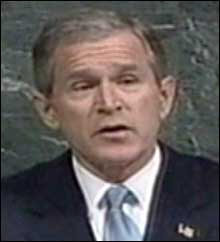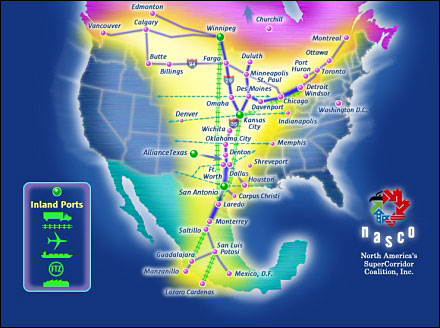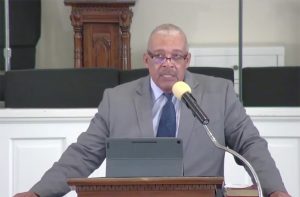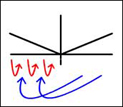Globalist Establishment Aspects of the George W Bush Administration
updated May 30, 2021

This article explains establishment agendas of the presidential administration of George W Bush.
This page is part of a larger article A Summary of Long Term Globalist Establishment Agendas of the Global Elite.
George W Bush Neoconservative Agendas
While Bush campaigned on a platform of a restrained foreign policy and being opposed to the idea of nation-building, after the September 11, 2001 attacks, Bush was fully prepared for an escalation of conflict in the Middle East, starting with the Invasion of Afghanistan and then Iraq. The attacks empowered the elements of the military-industrial complex and the neocons who formulated the strategies in the few years prior to the attacks.
Excerpts about Neoconservative aspects of the George W. Bush Administration, from Wikipedia:
The Bush campaign and the early Bush Administration did not exhibit strong support for neoconservative principles. As a candidate Bush argued for a restrained foreign policy, stating his opposition to the idea of nation-building and an early foreign policy confrontation with China was handled without the vociferousness suggested by some neoconservatives. Also early in the Administration, some neoconservatives criticized Bush’s Administration as insufficiently supportive of Israel, and suggested Bush’s foreign policies were not substantially different from those of President Clinton.
Bush’s policies changed dramatically immediately after the September 11, 2001 attacks. According to columnist Gerard Baker:
“It took, improbably, the arrival of George Bush in the White House and September 11, 2001, to catapult [neoconservatism] into the public consciousness. When Mr Bush cited its most simplified tenet — that the US should seek to promote liberal democracy around the world — as a key case for invading Iraq, neoconservatism was suddenly everywhere. It was, to its many critics, a unified ideology that justified military adventurism, sanctioned torture and promoted aggressive Zionism.”
Bush laid out his vision of the future in his State of the Union speech in January 2002, following the September 11, 2001 attacks. The speech, written by neoconservative David Frum, named Iraq, Iran and North Korea as states that “constitute an axis of evil” and “pose a grave and growing danger.” Bush suggested the possibility of preemptive war: “I will not wait on events, while dangers gather. I will not stand by, as peril draws closer and closer. The United States of America will not permit the world's most dangerous regimes to threaten us with the world’s most destructive weapons.”
Some prominent defense and national security personalities have been quite critical of what they believed was Neoconservative influence in getting the United States to war with Iraq despite it not being in the best interest of the United States. Retired General William Odom, who had once served as NSA Chief under Ronald Reagan, was openly critical of Neoconservative influence in the decision to go to war, having said “It’s pretty hard to imagine us going into Iraq without the strong lobbying efforts from AIPAC and the neocons, who think they know what's good for Israel more than Israel knows.”
Nebraska Republican U.S. Senator Chuck Hagel, who has been critical of the Bush Administration's adoption of neoconservative ideology in his book America: Our Next Chapter, writes, “So why did we invade Iraq? I believe it was the triumph of the so-called neo-conservative ideology, as well as Bush administration arrogance and incompetence that took America into this war of choice ... They obviously made a convincing case to a president with very limited national security and foreign policy experience, who keenly felt the burden of leading the nation in the wake of the deadliest terrorist attack ever on American soil.”
Bush Doctrine
The Bush Doctrine of preemptive war was explicitly stated in the National Security Council text “National Security Strategy of the United States,” published September 20, 2002. “We must deter and defend against the threat before it is unleashed... even if uncertainty remains as to the time and place of the enemy's attack... The United States will, if necessary, act preemptively.” Policy analysts noted that the Bush Doctrine as stated in the 2002 NSC document bore a strong resemblance to recommendations originally presented in a controversial Defense Planning Guidance draft written in 1992 by Paul Wolfowitz under the first Bush administration.
The Bush Doctrine was greeted with accolades by many neoconservatives. When asked whether he agreed with the Bush Doctrine, Max Boot said he did, and that “I think [Bush is] exactly right to say we can't sit back and wait for the next terrorist strike on Manhattan. We have to go out and stop the terrorists overseas. We have to play the role of the global policeman... But I also argue that we ought to go further.” Discussing the significance of the Bush Doctrine, neoconservative writer William Kristol claimed: “The world is a mess. And, I think, it's very much to Bush's credit that he's gotten serious about dealing with it... The danger is not that we're going to do too much. The danger is that we're going to do too little.”

The Carlisle Group is a massive “private equity firm” that raises money from wealthy individuals and companies, where it then reinvests the money into private defense companies that have extremely high profit margins. It is made up of well known politicians such as George Bush Sr. and James Baker, and it is one of the most powerful elements of the “military industrial complex”— which is a business built around the defense industry that is so large and powerful that it is able to influence the politics of war. This video explains the structure of the group and it explains its history of abuses.

View a four minute video clip from the film “Iraq for Sale: The War Profiteers,” detailing specific examples of excessive waste and fraud by the United States Government relating to the Iraq war. The documentary explains the “Cost Plus” program, which encourages contractors to run up the costs of their activities due to the contractors getting a percentage of the end result.

This article detals many information sources that examine the truth about what happened with the 9/11 attacks.

This video clip details evidence of how Prescott Bush— the grandfather of George W. Bush, had major ties to Adolph Hitler and the Nazi party though being a partner in the American bank “Brown Brothers Harriman,” and involvement in the Union Banking Corporation, which were actually Nazi money laundering operations that had connections to many individuals and companies involved in the workings of the Nazi party.
George W Bush Neoliberal Agendas

A map of the NAFTA superhighway previously posted on the SPP.GOV website.
Bush continued the process of furthering the goals of NAFTA and pushing for the associated FTAA, as well as starting construction of the Trans-NAFTA superhighway as a step for moving toward configuring a “North American Union,” which would eventually merge the countries of the North American Continent into a similar configuration as the European Union.

This video clip explains David Rockefeller’s involvement in creating and funding many Council on Foreign Relations (CFR) objectives, such as cultivating Latin American leaders who could be counted on to support Free Trade Area of the Americas (FTAA) objectives.

This video clip from the Alex Jones film “Endgame: Blueprint for Global Enslavement” explains how the secretive Bilderberg Group has been using stealth for strategically paving the way for the North American countries to be consolidated by merging the populations, monetary systems, militaries, and highways of the United States, Canada and Mexico.

After a well-publicized press release claimed that the Trans-Texas Corridor project had been cancelled, Alex Jones explains that the only difference is that the project which is integral in creating a future North American Union has only been renamed.
Article Tree
| A Summary of Long Term Globalist Establishment Agendas of the Global Elite |
| Globalist Establishment Aspects of the George W Bush Administration |








